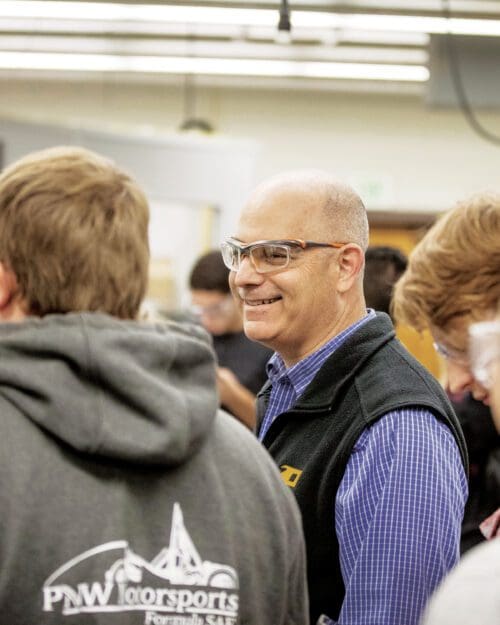Lionhearted Leaders: James Higley

Applied learning is the hallmark of James Higley’s classes
James Higley, professor of Mechanical Engineering Technology (MET) in the College of Technology at Purdue University Northwest (PNW) is a firm believer of applied learning in the classroom.
“I had all the theoretical classes in school,” says Higley. “Learning how to calculate a number and what that number means is important. However, it’s the hands-on approach where students gain a better understanding of concepts.”
Building, making, touching and breaking is how Higley describes his MET classes. His practical approach to teaching has students taking the lessons learned in class and directly applying them to different projects. According to Higley, the applied, or hands-on approach to learning, engages students and helps them develop a better understanding of the concepts, theories and models being studied.
For lessons on stress and strain, Higley has students break items in order to develop a greater understanding of the concept of strength. “Most students don’t learn by sitting at a desk, listening and writing things down, especially in engineering and technology,” explains Higley. “Students need to actually test concepts. That’s why I try to minimize lectures and focus on projects in my classes. It’s a more interesting way to learn.”
Building confidence
Helping students gain confidence and develop attention to detail is an important part of teaching mechanical engineering technology. “I have students start with small projects and work in small groups of two or three,” Higley explains. “As the semester progresses, the projects get more complicated and the students slowly gain more confidence.”
While students are working on their projects in the lab, Higley likes to walk around the room and check in on the groups’ progress. “I’ll walk around and point out different things,” he says. “I’ll let them know if something is not going to work and why, and offer suggestions on areas where they can improve on their projects.”
The importance of credibility
According to Higley credibility is one of the most important things an educator brings into the learning environment. “My education is only part of the credibility I bring into the classroom,” he says. “The other part is as a working professional in the industry. My work experience allows me the opportunity to share those real-world experiences with my students.”
It’s his work experience in the areas of design and manufacturing that helped him build relationships
with local and national manufacturing companies. These connections have resulted in numerous internships and job offers for his students.
In addition, Higley holds five U.S. patents as a result of his work in the field. Three of the patents are in the area of packaging machinery and the other two are in the firearms field. “Holding patents is another way of helping me connect to students and gain credibility and respect.”
The key to success
Higley, who has been at PNW since 1988, admits his favorite part of teaching is when students are able to figure out a problem or understand a concept that has eluded them. “One of the most satisfying parts of teaching is when students that have been fighting with a lesson or concept suddenly get it,” he says. “The ability to look at a problem, especially one that is not very well defined, and figure out a solution is one of the most important lessons I want students to take away from my classes. The technical things are going to change quickly, but the ability to be able to take what they’ve learned and figure out the problem will help them be successful in their future careers.”